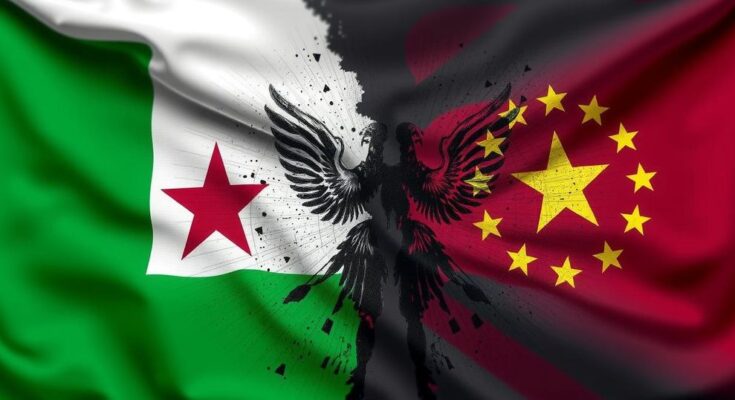Lt Gen Abdelfattah El Burhan’s recent visit to Eritrea has solidified military alliances amidst a growing crisis in Sudan. Discussions with President Isaias Afwerki centered on security and economic cooperation, raising concerns about escalating tribal conflict in eastern Sudan as armed groups mobilize. Eritrea’s strategic interests and military readiness to intervene further complicate the fragile regional dynamics, potentially transforming the ongoing war into a broader tribal conflict.
The recent visit of Lt Gen Abdelfattah El Burhan, the leader of Sudan’s Sovereignty Council and Commander-in-chief of the Sudanese Armed Forces (SAF), to Eritrea underscores a significant shift in military alliances amid the ongoing turmoil in Sudan. Meeting with Eritrean President Isaias Afwerki, both leaders discussed strategies for security cooperation and military collaboration, solidifying Eritrea’s role as a tactical ally. While both nations aim to enhance bilateral relations, concerns arise regarding the potential for escalating tribal conflicts in eastern Sudan as armed groups mobilize in collaboration with the SAF.
During his visit, El Burhan expressed appreciation for Eritrea’s assistance during Sudan’s unrest, emphasizing the need for increased cooperation in military and economic matters. Notably, Eritrea’s support comes amidst growing tensions in eastern Sudan, where various armed factions such as the Beja Congress and Eastern Battalion, many receiving training from Eritreans, could exacerbate the conflict dynamics. This situation raises fears of a worsening conflict that could spiral into tribal violence, drawing in neighboring groups and potentially destabilizing the region further.
Eritrea’s strategic interest is also at play, as the nation reinforces its military presence along its border to mitigate the spillover effects of Sudan’s crisis. Efforts to reopen vital trade routes, such as the Kassala-El Lafa highway, indicate a mutual interest in bolstering economic ties, which could enhance stability but may inadvertently heighten military tensions. Eritrea’s readiness to intervene in any escalated conflict in eastern Sudan further complicates the regional security landscape.
Analysts caution that the deepening military collaboration may transform the existing conflict between the SAF and Rapid Support Forces (RSF) into a broader tribal war, positioning it as a threat to peace and stability in the region. The militarization of eastern Sudan, combined with its vital geostrategic significance, underscores the risks of escalating tribal polarization in a delicate balance of power.
The military alliance between Sudan and Eritrea has emerged against the backdrop of ongoing conflict within Sudan, particularly affecting eastern regions. Sudan’s leadership, facing internal strife, seeks to stabilize alliances while managing armed groups that have gained traction in eastern Sudan due to their connections with Eritrean training camps. The strategic geographic location of eastern Sudan—home to critical resources and vital connections to the Red Sea—heightens the stakes for all parties involved, as conflicts could spill across borders into Eritrea. Understanding these dynamics is vital for addressing the potential for increased instability amid rising militarization and tribal tensions.
The alliance between Sudan and Eritrea raises serious concerns regarding regional stability as it risks igniting tribal conflicts within Sudan. With both countries committed to military cooperation and economic ties, the implications of this partnership could lead to escalated violence among regional armed groups, potentially transforming existing conflicts into broader tribal warfare. It is essential to monitor these developments carefully, as the militarization of eastern Sudan poses significant challenges to both internal and regional security.
Original Source: www.dabangasudan.org




